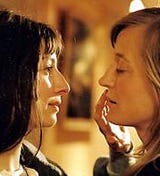Directed: Valérie Minettot
Written: Valérie Minetto and Cécile Vargaftig
Films like this are like relief from drought. Oublier Cheyenne is ambitious without trying too hard, quietly soulful without being sentimental, and full of ideas that are about lesbian lives rather than just the fact of "being" a lesbian. It's exactly the sort of grown-up lesbian film I would love to see more of and just can't imagine being made in the current American film climate.
Sonia (Aurelia Petit) is a high school teacher who loves her job and is one of those inspiring teachers we always wish we had or whom we remember fondly. She is mourning the departure of her lover Cheyenne (Mila Dekker), who we discover through various flashback sequences has been downsized from her position as a journalist in Paris, can't find another job and can't afford to live without the government handouts that are about to be cut off. Cheyenne reacts badly to her financial dependence on Sonia, finally deserting her to live "off the grid" in a cottage with no electricity, no running water and scavenging for or growing her own food.
Though they love each other passionately, Sonia and Cheyenne find that they can't reconcile their different wants from life - Cheyenne feels betrayed by the system and has a burning desire to escape, and Sonia can't imagine leaving her life and career behind to live in squalor. They are miserable together and miserable apart, and that is how our story begins.
Sonia tries to move on with her life without Cheyenne and hooks up with both Pierre (French heart-throb Malik Zidi) the sweet social revolutionary and the selfish player Beatrice (Guilaine Londez). Though they meet her sexual needs adequately enough, neither fill her with any sense of wonder or joy. They can't be what Cheyenne was, not only a lover, but a kind of sustenance for the soul that Sonia finds that she cannot do without. Resolving to see her, Sonia seeks out Cheyenne in the country and they begin again with the process of trying to compromise, for both their sakes.
Mixed up in the mess that is Sonia's life are a gorgeous young student convinced she needs to drop out who comes to Sonia for advice, and a Marxist crusader who lives on the land and constantly questions Cheyenne's commitment to her new, harsh existence. Cheyenne questions her own commitment too - is her pride so important that she can give up love for a lifetime of tramping around in the mud just to satisfy some philosophical ideal?
Oublier Cheyenne is both charming and fearless, a confident debut feature effort by writer-director Valerie Minetto that deserves much more recognition, both by lesbian and mainstream audiences, than it has received. In a time when lesbian films seem to be getting universally boring, glossy and/or facile, this was a welcome relief. Minetto's documentary background shines through as she injects real-life into the imaginary. She shows a deft touch with her direction, her sparse sets and lighting helping us to feel Sonia's despair, while still keeping the mood fresh and darkly comedic.
The performances in the film are excellent across the board. Aurelia Petit especially is fascinating to watch. She's dowdy and sexy at the same time and there's never a hint of questioning herself or her sexuality, she's just a lesbian teacher in love trying to negotiate her seemingly hopeless circumstances. When she finally decides to take control of her own fate she is comically resolute. I loved her performance as Sonia, and the chemistry between her and Dekker is palpable. I believed them as two ordinary women in love who have passion both for each other and their beliefs.
Mixed up throughout this love story is a serious commentary on the unemployed and disenfranchised in France today. Sonia finds herself sucked into the politics of those around her through no fault of her own, except an inability to really express what it is that she wants. She sees change everywhere: teachers at her school leave for higher paying private sector jobs, students drop out to become revolutionaries because they despair of the future. She sees corruption everywhere in the system but can't help believing that she still belongs inside it to help make it better, as much as Cheyenne feels the need to flee from it.
The personal becomes the political in this fascinating, relevant social portrait. It is just so excellent to see a story where lesbians exist within the world, not apart from it. It just goes to show, there really are thousands of different, interesting stories to be told about ordinary and extraordinary lesbian lives.






